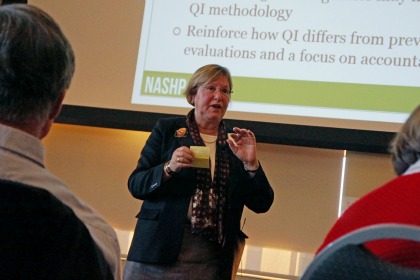In Maine, child health experts who have tackled how their state handles human papillomavirus (HPV) vaccinations can offer insights to colleagues in Tennessee or New Jersey, who may be facing different challenges in addressing HPV.

Judy Shaw, Ed.D., M.P.H., R.N., answers questions during the National Improvement Partnership Network Conference at UVM November 9, 2015. (Photo: UVM COM Design & Photography)
In Maine, child health experts who have tackled how their state handles human papillomavirus (HPV) vaccinations can offer insights to colleagues in Tennessee or New Jersey, who may be facing different challenges in addressing HPV.
That’s the kind of comparison and conversation facilitated among members by the National Improvement Partnership Network (NIPN), which represents more than 25 states. An Improvement Partnership (IP) is a state or regional collaboration of public and private partners that uses the science of quality improvement and a systems approach to change healthcare infrastructure and practice. Established in 1999, Vermont’s IP – the Vermont Child Health Improvement Program (VCHIP) – is housed in the University of Vermont Department of Pediatrics and convened NIPN to provide an organized support system across state lines to improve the quality of health care and outcomes for children and families and expand the reach of related projects. One such project is a multistate effort to increase HPV vaccination rates, funded by a five-year grant from the U.S. Centers for Disease Control.
In 2015, the Academic Pediatric Association honored NIPN with its Health Care Delivery award, recognizing its innovative approach to developing connections among states and helping other state IPs build relationships with their local agencies and government entities.
The award is validation of the original vision for NIPN that VCHIP Executive Director Judith Shaw, Ed.D., M.P.H., R.N., a UVM associate professor of pediatrics and nursing, had when she launched the interstate coalition. The program, she says, extended her efforts to bolster healthcare improvements in Vermont.
“I wanted to be able to share ideas and exchange information with interested colleagues in other states,” says Shaw.
“Changing how clinicians practice takes more than education – it requires a systematic approach to understanding what they are doing in their offices, trying out new strategies, studying the results, and implementing the changes that lead to improved practice and outcomes,” says Wendy Davis, M.D., NIPN associate director and UVM professor of pediatrics.
NIPN has hosted an annual meeting since 2008 in different member states – as well as Washington, D.C., in alternate years to connect with policy makers – in order to allow members to share challenges and successes and discuss steps for the future, says Chealsea Hunter, project coordinator for VCHIP. Members talk about the latest trends and federal issues that affect all of them and use this forum to generate ideas for state-based and collaborative projects.
At the most recent meeting, held in November 2015 at UVM’s Davis Center, one of the hot topics was “adverse childhood events,” or ACEs. James Hudziak, M.D., professor of psychiatry, pediatrics and medicine and a child and adolescent psychiatrist, spoke about the effect that traumatic experiences such as physical or sexual abuse or parental divorce have on a child’s early brain development. A child health expert from Utah discussed a project involving developmental screening in primary care settings to improve early identification of children who are having difficulties as a result of exposure to these events.
NIPN continues to expand its reach. “We’re talking to Alaska right now, and their population and health system reflect some very unique characteristics and challenges,” Hunter says. For example, access to child health services might involve a day’s drive or a plane ride for patients or health care professionals. By comparison, Florida is also developing an IP, and its population is so dense and diverse that it’s almost like three different states in one.
NIPN encourages regional collaboration, so that states with similar challenges can learn from each other. After launching a strong IP in South Carolina, leaders there helped colleagues in Tennessee develop their own version based on what worked in the neighboring state. Now, they’re discussing projects they could do together, says Hunter, who adds, “That’s exactly what we want to see happening.”
Visit the NIPN website.